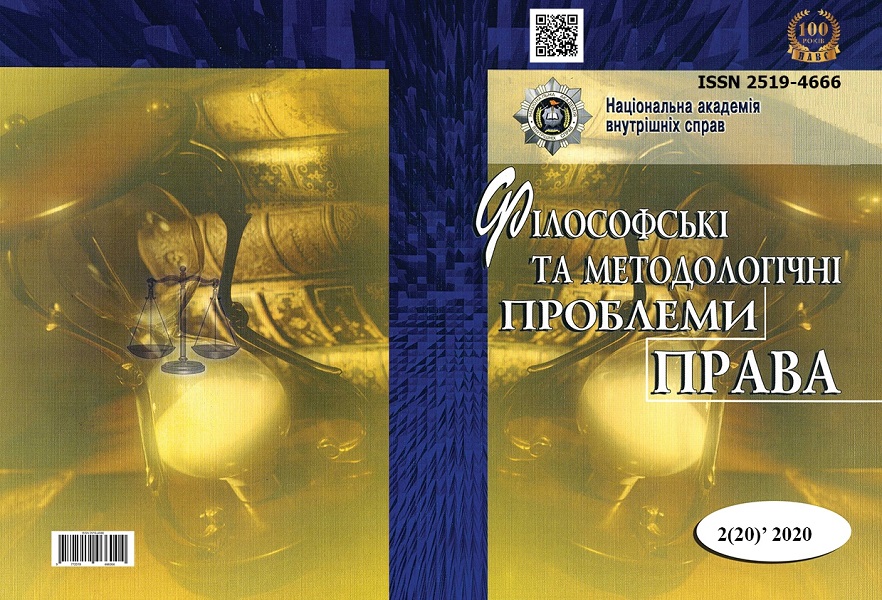Ethical and Legal Views of Pythagoras
Abstract
The article on the ethical and legal views of Pythagoras contains information about the universal system of knowledge created by the ancient Greek philosopher, thinker and sage Pythagoras, and the place in it of ideas and theories relating to ethics and law. Pythagoras was never just a scholastic theorist. His ideas, including ethical and legal, were put into practice by the thinker himself and his students and followers. The ideas of justice and universal love are of great ideological and practical importance. The meaning of the concept of justice changed both thousands of years before Pythagoras and thousands of years after him. Todayʼs understanding of justice is based largely on the definition given in antiquity. Todayʼs authors refer to Plato, who considered justice to virtue, to Aristotle, who associated justice with merit before society, but do not refer to Pythagoras, who two centuries before these philosophers gave the definition of justice as retribution for equal. Based on a general understanding of justice, Pythagoras discovered a new form of it ‒ legislative, which is even better than judicial justice. The purpose of this study is to try to trace the origins of the philosophical and theoretical foundations of European law. The methodological basis of the study is a polymethodological «horizontal» approach. The presented material represents a scientific novelty, as the issues analyzed by the authors have not been studied in Ukraine for three decades. It can be concussed that both theorists and practitioners should recall the ethical and legal views of Pythagoras, who in his universal system of knowledge did not separate ethics from law or law.
Keywords: justice; law; ethics; law; retaliatory justice; love-harmony.
Downloads
References
Bertman S. Handbook to Life in Ancient Mesopotamia. Oxford : Oxford University Press, 2005. 416 p.
Бхагаван Шри Раджниш (Ошо). Геометрия осознаности. Мистическое учение Пифагора. СПб. : Весь, 2010. 190 с.
On Pythagoreanism / Ed. by: G. Cornelli, R. McKirahan, C. Macris. Berlin, Boston : De Gruyter, 2013. 532 p. doi: https://doi.org/10.1515/9783110318500.
Древнеегипетская книга мертвых: Слово устремленное к свету. М. : ЭКСМО, 2004. 432 с.
The Pythagorean Sourcebook and Library: An Anthology of Ancient Writings Which Relate to Pythagoras and Pythagorean Philosophy / D. Fideler (Ed.). Grand Rapids (Michigan, US) : Phanes Press, 1987. 362 p.
Gemelli Marciano L. M. The Pythagorean Way of Life and Pythagorean Ethics. A History of Pythagoreanism. Cambridge : Cambridge University Press, 2014. P. 131‒148. doi: 10.1017/CBO9781139028172.007.
Horky Ph. S. Exoterism and the History of Pythagorean Politics. Plato and Pythagoreanism. Oxford : Oxford Scholarship Online, 2013. P. 85‒124. doi: 10.1093/acprof:oso/9780199898220.003.0003.
Ясперс К. Истоки истории и ее цель. Філософія. Природа, проблематика. Класичні розділи : хрестоматія. Київ : Каравела. 2010. 464 с.
Європейський словник філософії: Лексикон неперекладностей / під кер. Б. Кассен. Київ : Дух і Літера, 2009. Т. 1. 576 с.
Костицький М. В. Державницько-політичні погляди в універсалістській системі світогляду Піфагора. Філософські та методологічні проблеми права. 2020. № 1 (19). С. 118–125. doi: https://doi.org/10.33270/02201901.118.
Laertius D. Lives of Eminent Philosophers / ed. by T. Dorandi. Cambridge : Cambridge University Press, 2013. 943 p. doi : https://doi.org/10.1017/CBO9780511843440.
Pello C. The Lives of Pythagoras: A Proposal for Reading Pythagorean Metempsychosis. Rhizomata. 2018. Vol. 6. Issue 2. P. 135–156. doi: https://doi.org/10.1515/rhiz-2018-0007.
Пифагор. Золотой канон Фигуры эзотерики. М. : ЭКСМО–Пресс, 2001. С. 294–296.
Пифагоровы законы и нравственные правила. Афоризмы Эпиктета. М. ; СПб. : Олма-Пресс, 2000. 384 с.
Пролеев С. В. История античной философии. Киев : Ваклер, 2001. 512 с.
Редкин П. Г. Из лекций по философии права в связи с философией вообще. СПб. : Тип. М. М. Стасюлевича, 1889. Т. 2. 403 с.
Strohmeier J., Westbrook P. Divine Harmony: The Life and Teachings of Pythagoras. Wigan (UK) : Harmonia Books, 2012. 162 p.
Хрестоматия по древней истории / под ред. В. В. Струве. М. : Гос. учеб.-пед. издат., 1936. Т. 1. 236 с.
Abstract views: 868 PDF Downloads: 559
Copyright (c) 2021 Philosophical and Methodological Problems of Law

This work is licensed under a Creative Commons Attribution-NonCommercial-NoDerivatives 4.0 International License.
- Authors reserve the right to authorship of their own work and transfer to the magazine the right of the first publication of this work under the terms of the Creative Commons Attribution License, which allows other persons to freely distribute published work with mandatory reference to authors of the original work and the first publication of an article in this magazine.
- Authors have the right to enter into separate additional agreements on non-exclusive dissemination of the work in the form in which it was published in the journal (for example, to post an article in the institution's repository or to publish as part of a monograph), provided that the link to the first publication of the work in this journal is maintained.
- The journal's policy allows and encourages the posting of articles by authors on the Internet (for example, in electronic storehouses of institutions or on personal websites), both before the submission of this manuscript to the editorial office and during its editorial processing, as this contributes to the creation of a productive scientific discussion and positively affects the efficiency and dynamics of citing the published work.




